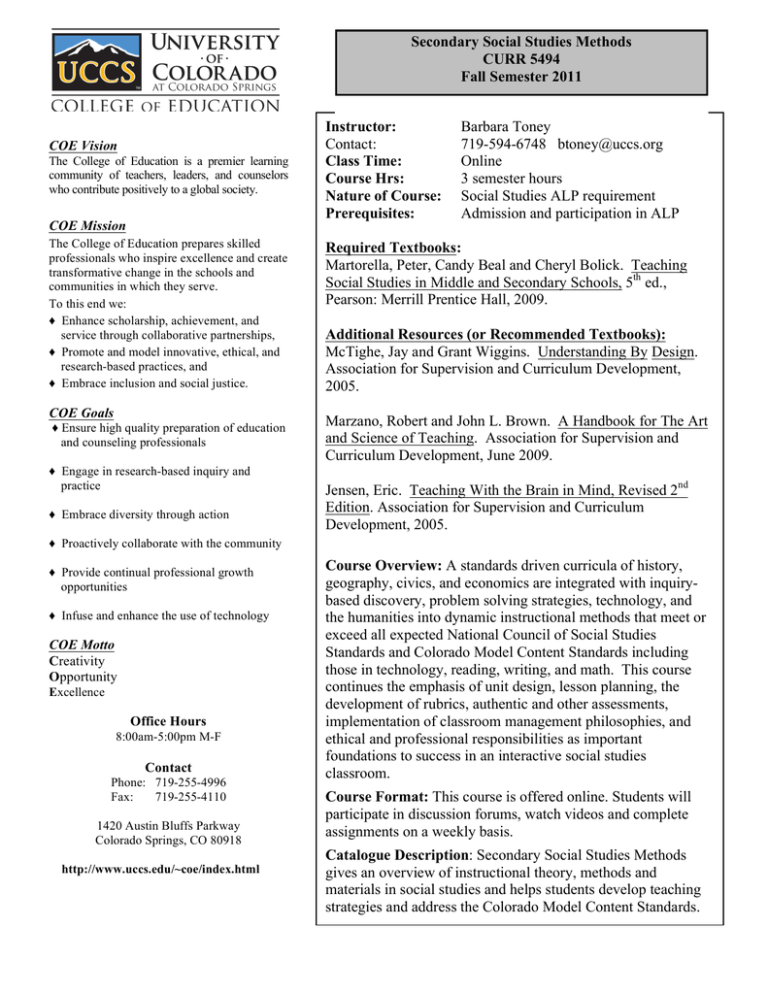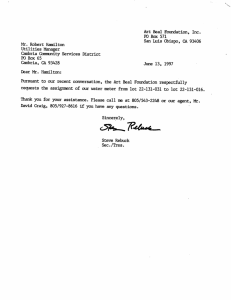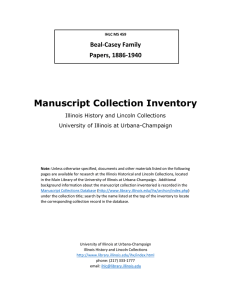ook Instructor: Class Time:
advertisement

ook COE Vision The College of Education is a premier learning community of teachers, leaders, and counselors who contribute positively to a global society. COE Mission The College of Education prepares skilled professionals who inspire excellence and create transformative change in the schools and communities in which they serve. To this end we: ♦ Enhance scholarship, achievement, and service through collaborative partnerships, ♦ Promote and model innovative, ethical, and research-based practices, and ♦ Embrace inclusion and social justice. COE Goals ♦ Ensure high quality preparation of education and counseling professionals ♦ Engage in research-based inquiry and practice ♦ Embrace diversity through action Secondary Social Studies Methods CURR 5494 Fall Semester 2011 Instructor: Contact: Class Time: Course Hrs: Nature of Course: Prerequisites: Barbara Toney 719-594-6748 btoney@uccs.org Online 3 semester hours Social Studies ALP requirement Admission and participation in ALP Required Textbooks: Martorella, Peter, Candy Beal and Cheryl Bolick. Teaching Social Studies in Middle and Secondary Schools, 5th ed., Pearson: Merrill Prentice Hall, 2009. Additional Resources (or Recommended Textbooks): McTighe, Jay and Grant Wiggins. Understanding By Design. Association for Supervision and Curriculum Development, 2005. Marzano, Robert and John L. Brown. A Handbook for The Art and Science of Teaching. Association for Supervision and Curriculum Development, June 2009. Jensen, Eric. Teaching With the Brain in Mind, Revised 2nd Edition. Association for Supervision and Curriculum Development, 2005. ♦ Proactively collaborate with the community ♦ Provide continual professional growth opportunities ♦ Infuse and enhance the use of technology COE Motto Creativity Opportunity Excellence Office Hours 8:00am-5:00pm M-F Contact Phone: 719-255-4996 Fax: 719-255-4110 1420 Austin Bluffs Parkway Colorado Springs, CO 80918 http://www.uccs.edu/~coe/index.html Course Overview: A standards driven curricula of history, geography, civics, and economics are integrated with inquirybased discovery, problem solving strategies, technology, and the humanities into dynamic instructional methods that meet or exceed all expected National Council of Social Studies Standards and Colorado Model Content Standards including those in technology, reading, writing, and math. This course continues the emphasis of unit design, lesson planning, the development of rubrics, authentic and other assessments, implementation of classroom management philosophies, and ethical and professional responsibilities as important foundations to success in an interactive social studies classroom. Course Format: This course is offered online. Students will participate in discussion forums, watch videos and complete assignments on a weekly basis. Catalogue Description: Secondary Social Studies Methods gives an overview of instructional theory, methods and materials in social studies and helps students develop teaching strategies and address the Colorado Model Content Standards. Course Objectives: As a result of participating fully in the experiences of this course, teacher candidates will be able to: 1. Create standards-based lesson plans and units for the social studies classroom that will demonstrate an understanding of the new Colorado Content Standards for Social Studies, as well as the National Council for Social Studies Standards. 2. Develop and apply a variety of instructional methods in lesson and unit planning to include integrated instruction, cooperative learning, differentiated instruction, and other effective learning strategies to meet a variety of student needs, interests, and learning styles. 3. Implement strategies for managing student behavior and creating an effective learning environment. 4. Demonstrate proficiency in using technology not only as a teaching tool, but also as a practical method of professional communication with colleagues, professors, parents and students. 5. Develop a personal philosophy of teaching social studies and a reflection that evaluates one’s performance in the class and a plan for future professional development. 6. Integrate reading and writing for students designed to build an understanding of a variety of texts, of themselves, and the cultures of the United States and the world. Course Expectations: In abiding by the general considerations for this course, students will display respect for diverse opinions and ideas, demonstrate professionalism, commitment, and accountability, and be renewed by others in an active and dynamic learning environment. Technology Competencies: It is expected that candidates begin our program with basic computing skills that include using Microsoft Word to write papers, accessing online research databases, and corresponding by email. Knowledge of the use of technology-supported multimedia, such as PowerPoint and other audio/video resources, is a plus; those who do not already have a working knowledge of their use will develop it over the course of their program. Communications will be by email and Blackboard. All students must obtain a UCCS email address and check it regularly (at least every other day) so as not to miss announcements. An idea: if your UCCS address is not your primary one, have emails from it rerouted to the one you check daily. Blackboard & TaskStream Competencies: All faculty members in the Department of Curriculum and Instruction are required to use Blackboard to manage their courses. This includes the syllabus, course schedule, and assignment criteria (if not detailed in the syllabus). In addition to using Blackboard, TELP faculty are required to develop or identify core assignments that must be uploaded to TaskStream, our data management system. All TELP students are required to have TaskStream accounts. 2 Resubmission of Assignments: The resubmission of assignments will be accepted only if the original assigned grade falls below the B- level. The highest possible assigned grade for significantly improved resubmitted work will be a B-. This policy is consistent among and between all faculty in the TED Program at UCCS. Late Policy: Assignments will be due on the designated date on the schedule presented in the syllabus. No late assignments will be accepted unless prior approval is gained. Assignments received later than the due date will receive an automatic 5% reduction in grade for every class date late. Written Assignment Criteria: All written material should be typed, double spaced, and submitted in the revised APA 6th edition format. If you have difficulty in the area of written communication skills, please seek the assistance of the Writing Center in Columbine Hall, room 316 (719-255-4336). Additional resources include the UCCS Kraemer Library Website and the American Psychological Association website at http://apastyle.org/ When constructing your written materials, special attention must be given to the following: • grammar, punctuation, spelling • sentence and paragraph structure • tense and parallel usage • organization, neatness, and content knowledge • be specific, say what you mean Ethical Conduct: The responsibility for ethical conduct, academic honesty and integrity rests with each individual member of the UCCS community. The Student Codes and Academic Policies (which may be found at http://www.uccs.edu/~dos/studentconduct/index.html) are followed in this class. In general, academic dishonesty includes, but is not limited to, cheating on assignments or examinations, plagiarism (which means misrepresenting as your own any work done by another), misuse of academic materials, or interfering with another student’s work. Violations of the honor code may result in dismissal from the program. Diversity Statement: The faculty of the College of Education is committed to preparing students to recognize, appreciate, and support diversity in all forms – including ethnic, cultural, religious, gender, economic, physical, and intellectual – while striving to provide fair and equitable treatment and consideration for all. Any student who believes that he/she has not been treated fairly or equitably for any reason should bring it to the attention of the instructor. Special Assistance: Reasonable accommodations will be made for students who have a documented disability, which interferes with completion of this course. It is your responsibility to request any accommodations before assignments are due. Please contact Disability Services (255-3354) or the instructor if you have questions. Military Students: Military students who have the potential to participate in military activities including training and deployment should consult with faculty prior to registration for any course, but no later than the end of the first week of classes. At this time, the student should provide the instructor with a schedule of planned absences, preferably signed by the student's commander, in order to allow the instructor to evaluate and advise the student on the possible impact of the absences. 3 In this course, the instructor will consider absences due to participation in verified military activities to be excused absences, on par with those due to other unavoidable circumstances such as illness. If, however, it appears that military obligations will prevent adequate attendance or performance in the course, the instructor may advise the student to register for the course at another time, when she/he is more likely to be successful. Appeals: In any academic issue, including attendance decisions, students may exercise their right to appeal. Should the faculty member and student be unable to agree on appropriate accommodation under this policy, either party shall have the right to request mediation as outlined in the grievance policies of the College of Education and the UCCS Student Standards. UCCS Grading Scale: A 94% - 100% B+ 87% - 89% C+ 77% - 79% D+ 67% - 69% F below 60% AB C D 90% - 93% 84% - 86% 74% - 76% 64% - 66% BCD- 80% - 83% 70% - 73% 60% - 63% Session/ Date 1. 08/22/11 Required Readings Beal, Ch.1 Beal, Ch.2 Topics Asmts Class work Overview and Introduction- What is Social Studies and Why Study Social Studies? Quest 4 p.21 Threaded Discussion 2. 08/29/11 Beal, Ch.3 Primary Sources 3. 09/05/11 None Labor Day Primary Sources Asm’t None Put Social Studies Standards and CTQS into an online portfolio that will contain important documents Threaded Discussion 4. 09/12/11 Beal, Ch.4 Organizing and Planning P 39-40: 10 themes of Framework of SS Standards Effective Teaching Strategies- What works and what doesn’t. What to use when. 5. 09/19/11 Beal, Ch.3 Social Studies Content Ch 3 p 80, #13 Threaded Discussion The Social Sciences: Geography, History , Economics, Political Science, Anthropology, Sociology, Psychology 6. 09/26/11 Teaching Articles Beal, Ch.3 Beal, Ch.5 Finding resources for effective teaching strategies 4 Lesson Plan for Taskstream Readings’ Ch 5 p 156 #5. Threaded Discussion No class Colorado Academic Standards Effective Teaching Strategies Session/ Date 7. 10/03/11 Required Readings Beal, Ch.8 Topics Asmts Class work Individuals, groups and institutions 8. 10/10/11 Beal, Ch.5 Content-Specific Lesson Plans Ch8. 0 245, #4-5. Threaded Discussion Threaded Discussions: Simulations, role playing, questioning strategies, small groups, cooperative learning Creation of worksheets and activities Civics LP --p. 214 #3 Detecting bias in campaign ads p. 225, Fig.8.2, creating issues-based unitsthreaded discussions Creating Effective Instructional Strategies List of appropriate uses of technology and media in the Social Studies Classroom None Diversity, culture, ethnicity, individual behaviors and group behaviors. Core Assignments: History, Geography, Economics, Civics Lesson plans Strategies to increase student achievement 9. 10/17/11 Beal, Ch.6 10. 10/24/11 Beal, Ch.7 11. 10/31/11 Beal,Ch.8 US and its role in the world, Country Focus and Global Focus 12. 11/07/11 Beal, Ch.9 Content 13. 11/14/11 Beal, Ch.10 Technology/Media 14. 11/21/11 15. 11/28/11 16. 12/05/11 None Thanksgiving Break Differentiation and Brain Research Evaluation and Assessment Strategies, Blooms Beal Ch.11 Beal, Ch.12 Concepts, Fact vs. Opinion, Problem Solving The Responsibility of Citizenship in a Democracy 5 Social Studies skill development TCAP skills Necessary skills Learning Strategies None Unit Plan Online folder containing assessment tools and Ways to assess, rubrics, test creation, reliability and validity, assessing competence Session/ Date Required Readings 17. 12/12/11 Topics Asmts resources Web sites and Resources Share online Compiled during folder with semester fellow classmates Class work Strategies for Student Engagement, Effective Instruction, Cooperative Learning, ASSIGNMENTS Assignment Primary Sources Creating Effective Instructional Strategies in lesson plans Creating Wellconstructed lesson plans Core assignments: Content Lesson Plans: History Core assignments: Content Lesson Plans: Geography Core assignments: Content Lesson Plans: Economics Web Site and Resources online folder. Description (see detailed assignment instructions and rubrics in Blackboard.) Create a short example or locating and using primary sources effectively in a lesson. CTQS Assessment Methods I.3, III.4 Demonstrate that you can effectively create and implement the instructional strategies portion of a lesson plan. II.3 Use TaskStream template to create the lesson for your first observation. I.1-5, III.2, III.8, Use to create a lesson for TaskStream Using the TaskStream template and the related Colorado Acadmic Standards and Evidence Outcomes, develop a lesson plan for teaching a history lesson that utilizes a graphic organizer I.2, I.1, I.3, I.4 Lesson plan rubric Using the TaskStream template and the related Colorado Acadmic Standards and Evidence Outcomes, develop a lesson plan for teaching a geography lesson that utilizes maps or Google Earth I.1, I.2, I.3, I.4 Lesson plan rubric Using the TaskStream template and the related Colorado Acadmic Standards and Evidence Outcomes, develop a lesson plan for teaching an economics lesson that utilizes a graphic organizer I.1, I.2, I.3, I.4 Lesson plan rubric In this semester-long project you will be creating and adding to, an online folder of Web sites and resources that will be useful to you in lesson planning. III.4 Online web/resources folder 6 Assignment Core assignments: Content Lesson Plans: Civics Unit Lesson Plan Description (see detailed assignment instructions and rubrics in Blackboard.) Using the TaskStream template and the related Colorado Academic Standards and Evidence Outcomes, develop a lesson plan for teaching a civics lesson incorporates facts, generalizations or opinions worksheets. Using the TaskStream template, develop a plan for a unit you intend to teach. 7 CTQS Assessment Methods I.1, I.2, I.3, I.4 Lesson plan rubric I.1-4, III.1, III.2, III. 1-8 Unit plan rubric




